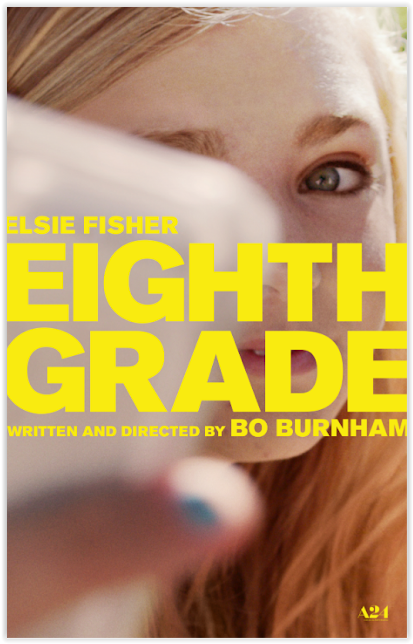The edge of fourteen
Monday, December 12, 2022
What’s the greatest film yet made about and featuring generation Z? The answer could easily be Eighth Grade, Bo Burnham’s stellar 2018 effort that stars Elsie Fisher as a 13-year-old struggling to fit in and navigate the turbulence that is early adolescence. Last week, the CineVerse crew graded this examination of teen angst and named it to the honor roll among coming-of-age films (a recording of our group discussion is available here). Our assessment? Read on.
What struck you as interesting, unexpected, memorable, refreshing, or curious about Eighth Grade?
- It’s one of the most honest and authentic movies about the adolescent experience ever created. It helps that the filmmakers cast real eighth graders and that director Bo Burnham carefully researched this age group, watching YouTube vlogs made by teens, including those created by Fisher, who plays Kayla.
- It’s further to the movie’s credit that it casts believable-looking adolescents, including a pimply-faced and slightly pudgy lead actress.
- Plenty of previous rite-of-passage pictures and movies about teenagers offer happy endings and resolutions to conflicts characters face earlier in the story. But Eighth Grade dares to present a story about a teen with an uncertain future – a girl who doesn’t necessarily experience an epiphany or life-changing event in the course of the story. Eighth Grade presents a series of vignettes across two weeks of a teenager’s life and isn’t trying to make a grand statement that can be universally applied.
- Niles Schwartz, Slant Magazine reviewer, wrote: “Coming-of-age films typically mandate that its heroes charge confidently into the future. While Kayla finds that confidence here, Burnham’s screenplay is thankfully not so sentimental that it guarantees that life will get any easier for her.”
- Some of these slice-of-life moments are cringy and uncomfortable – often in humorous but also sometimes disturbing ways. The good news is that the film isn’t mean-spirited or snarky toward its characters.
- Deep Focus Review writer Brian Eggert wrote: “Although the humor sometimes places Kayla or her father at the center of a joke, they’re never the butt of the joke or mocked. That distinction is significant to maintain the film’s astounding balancing act between a coming-of-age comedy and a heartrendingly precise depiction of teenage insecurity. It allows Kayla’s inner life, however transitory and small in the grand scheme, to carry gravity.”
Major themes
- Coming-of-age and the difficulties transitioning into full-blooded adolescence. Much has changed for Kayla in the three years since she entered middle school, and even more is about to change as she progresses to high school, a period that could be better or worse than what she experienced in eighth grade.
- The young current generation depicted in Eighth Grade certainly has its unique challenges that Gen X and Boomers didn’t face, including living two lives—one online and one in the real world—and keeping up with modern technology. But most of the key difficulties explored are universal and relatable, such as the need to feel accepted, the resentment and exasperation kids feel toward their parents, and the desire to explore/experiment with sexuality.
- Fake it till you make it. Kayla projects an image of confidence, happiness, and wisdom in her YouTube videos, but in reality, she suffers from anxiety, low self-esteem, poor self-image, and self-doubt. We see her pretend to be comfortable and in control among her peers, but deep down she is unsure and vulnerable. This film stresses the crucial importance among teenagers to fit in and feel liked and accepted by other adolescents.
- The importance of having a self-dialogue. Kayla has very few followers on her YouTube channel, and equally few social media likes and friends in general. But she serves as her own best friend, in a way, by talking to herself in videos, including time capsule footage she creates for her future self. While the pre-middle school video she creates painfully reminds her that she hasn’t forged friendships nor made the progress she had hoped by this point, these self-pep talks may help to buoy her confidence and put her physical and personal growth in proper perspective.
- The priceless value of parental support. Kayla may not appreciate her dad’s efforts, but the hug she gives him during the campfire scene indicates how imperative a part her dad plays in her life. Mark may appear to some as too lenient, permissive, and tolerant of her disrespect, but the patience he demonstrates with his daughter and the unconditional love he expresses verbally and nonverbally underscore how supportive and nurturing he truly is. This movie demonstrates how treacherous a tightrope many parents have to walk with their teenagers and how easy it is for mom and dad to misunderstand matters and often make things worse.
- We are often stronger than we give ourselves credit for, even at vulnerable times. Recall how Kayla has the courage to attend Kennedy’s pool party (even though she knows she will be alienated), later confronts Kennedy about being snubbed, and isn’t afraid to approach and talk to Aiden, her secret crush. Kayla demonstrates agency, confidence, and honesty, despite her insecurities and relatively quiet nature.
Similar works
- The Edge of Seventeen
- Lady Bird
- Welcome to the Dollhouse
- John Hughes films about teenagers, including Pretty in Pink, Sixteen Candles, and The Breakfast Club
- Pump Up the Volume
- Thirteen
- Booksmart
- The Perks of Being a Wallflower
- Mustang
- Moonlight
- Pin Cushion
- Mean Girls
- The 400 Blows




